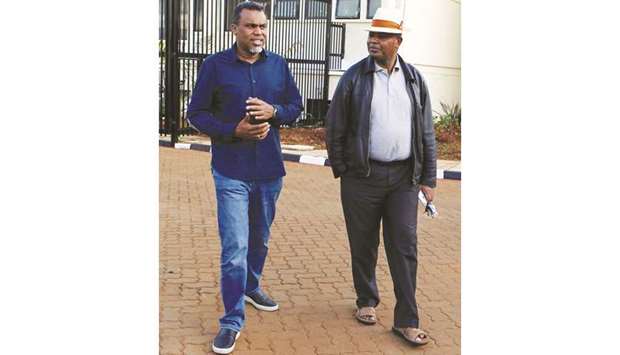Noordin Haji, head of public prosecutions in Kenya, is the urbane son of one of the country’s most prominent families.
George Kinoti, born in the slums, rose from burly beat cop to head the powerful police investigation department.
Together, they are building corruption cases against top Kenyan officials.
This week, the finance minister and other officials were charged with financial misconduct, marking the first time police have arrested a sitting finance minister in an east African nation notorious for graft.
Both men credit their success in part to an unlikely friendship forged while working together in the field.
“Prosecutors and investigators never worked together, but since me and Kinoti came into office that has changed,” Haji told Reuters at his Nairobi office, where leather-bound law books and the graceful arabesques of Islamic art line the walls.
“We do have a personal relationship as friends,” said the trim, silver-haired 46-year-old, appointed director of public prosecutions (DPP) last August.
“We are able to sit down and agree without having turf wars.”
The first big case the two worked on together last year was the alleged theft of nearly $100mn from the National Youth Service.
Kinoti hand-picked officers he could trust to work on the case, Haji said.
Prosecutors charged 43 suspects, including a principal secretary, the most senior career bureaucrat in a ministry.
The case against them is still ongoing, but five banks have already been fined nearly $4mn for failing to report suspicious transactions.
Not everyone from the police and prosecutor’s offices liked working together, said Haji.
Those who didn’t were edged aside.
“We had to build a team that would gel,” he said.
Kinoti, who bears the scars of numerous shoot-outs - including one where gangsters left him for dead - said police were willing to work with Haji because of his experience and demeanour, honed during 18 years in the Kenyan intelligence service.
Unlike most senior officials, Haji never stood on ceremony, he said. “He’s the first DPP I can say who is a polished field officer. He knows the pains we undergo in the field,” said Kinoti, 51.
“He’s so humble. It has won all my officers.”
Such pronouncements may be met with scepticism from Kenya’s embattled anti-corruption campaigners, who have seen years of official promises to tackle graft come to nothing while police clubbed and gassed demonstrators demanding change.
“The superlatives are flowing fairly thick, and we’ve been here many times before,” said prominent campaigner John Githongo.
President Uhuru Kenyatta promised to tackle graft when he was elected in 2013, but results have been slow.
Corruption continues to drag down economic growth and investor confidence.
Officials are wary of quantifying the total loss, but a former head of the government’s anti-graft watchdog told Reuters in 2016 that around $6bn, a third of the annual state budget, was lost to graft in Kenya every year.
Githongo said the charges against Finance Minister Henry Rotich, which stem from an investigation into the misuse of funds in two dam projects, were a good first step.
He noted Kinoti has a reputation as a courageous and honest cop. After he was appointed head of the Directorate of Criminal Investigations in January 2018, Kinoti swiftly disbanded the Flying Squad, a unit formed to combat robberies and car-jackings but accused of orchestrating them.
“They thought robberies (on the roads) would rise,” laughed Kinoti. “Instead they stopped!”
For three months, Kinoti said, his phone buzzed with influential Kenyans seeking to present discreet gifts.
Haji trained as a lawyer, but after a short stint as state counsel in the attorney general’s office he moved to the National Intelligence Service.

Kenya’s Director of Public Prosecutions (DPP) Noordin Haji and Kenya’s Director of Criminal investigations (DCI) George Kinoti walk after a meeting in Nairobi.
